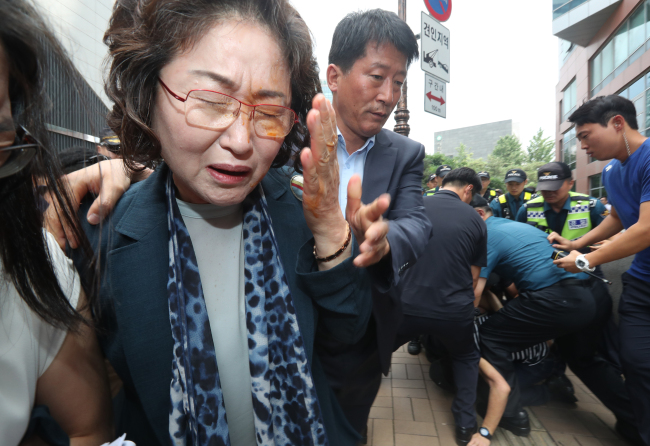Korea launched a 1 billion yen ($9.55 million) fund on Thursday for the victims of Japan’s sexual slavery during World War II despite unabated protests from some survivors and civic groups.
The Foundation for Reconciliation and Healing held its inauguration ceremony and first meeting of the board of directors at its secretariat in downtown Seoul.
 |
Kim Tae-hyeon, professor emeritus in social welfare studies at Sungshin Women’s University, exits the event as one of the protesters threw a capsaicin powder at her face. (yonhap) |
The participants included president Kim Tae-hyeon, professor emeritus in social welfare studies at Sungshin Women’s University, and nine other members of the preparation committee, including a director-general from each of the foreign and women and gender equality ministries.
The organization is the fruit of years of grueling negotiations between Korea and Japan that led to a Dec. 28 agreement between the two countries’ foreign ministers.
Under the settlement, Japanese Prime Minister Shinzo Abe acknowledged the government’s responsibility for the atrocities, offered an apology and vowed 1 billion yen from state coffers for the foundation.
Yet controversy lingers as Tokyo continues to demand the removal of a statue of a girl erected in front of the Japanese Embassy in Seoul to represent the victims.
Speculation is also growing over the use of the funds and the foundation’s sustainability. The bulk of the money, which is forecast to come in as early as next month, has been earmarked for “consoling the victims,” though the board has yet to discuss details of its projects, Kim said.
“The purpose of the foundation is to carry out work to regain the victims’ honor and heal their damaged dignities. It’s not a scholarship foundation, and we cannot and will not use the money if it doesn’t meet that very purpose,” she said at a news conference.
“As shown in the agreement, the statue and the 1 billion yen are completely separate issues. The money transfer never hinged on whether the statue is taken down or not.”
Kim also said she has met with 37 surviving victims to hear their voices. Her request to see three others, associated with the Korean Council for the Women Drafted for Military Sexual Slavery by Japan, was rejected.
“There are not many who resist the agreement. Other than those with the council, however, there are some opponents, including two staying at the House of Sharing (another advocate group) who called for the settlement to be broken.”
The event was marred by the demonstration of opponents, including one man who threw capsaicin powder at Kim’s face as she exited the event. She was taken to a nearby hospital.
The conference room was also occupied by some 20 college students declaring the deal null and void and urging the foundation be called off. After being dragged out, they continued their protest outside the building, chanting slogans and their opposition to the plan.
By Shin Hyon-hee (
heeshin@heraldcorp.com)




![[Today’s K-pop] Blackpink’s Jennie, Lisa invited to Coachella as solo acts](http://res.heraldm.com/phpwas/restmb_idxmake.php?idx=644&simg=/content/image/2024/11/21/20241121050099_0.jpg)



